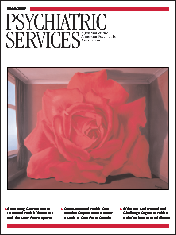Use of PASRR Programs to Assess Serious Mental Illness and Service Access in Nursing Homes
Abstract
OBJECTIVE: This study assessed the implementation of state Preadmission Screening and Resident Review (PASRR) programs with respect to identification of serious mental illness among nursing facility applicants and residents and access to mental health services. METHODS: A national survey was conducted with representatives from agencies that implement PASRR in all 50 states and the District of Columbia. Also, 44 states sent PASRR data for review. Four states were selected for an in-depth study; six nursing homes per state were selected and one staff member from each facility was interviewed (N=24). Medical records were reviewed for 30 to 40 residents from each facility who met criteria for potentially having a disabling serious mental illness (N=786). RESULTS: Medical records showed that 50 percent of patients at the time of admission and 68 percent of patients at the time of the record review had a psychiatric diagnosis, typically a diagnosis of depressive disorder. At the time of admission, fewer records identified individuals with a serious mental illness (9 to 20 percent) or a primary diagnosis of any psychiatric illness (5 to 12 percent). Many records indicated that in-depth, required PASRR screens were not performed. Ninety percent of the states reported that Medicaid covers only basic psychiatric consultation services, such as medication monitoring, in nursing facilities. Between 30 and 32 percent of national survey respondents also characterized access to facilities that provide mental health services as limited and of variable quality. Although all 24 nursing facilities reported providing psychiatric consultation services, access to other mental health services, such as psychosocial rehabilitation or individual counseling, varied considerably. CONCLUSIONS: Nursing facility compliance with administration and documentation of PASRR screens appears problematic. Nevertheless, there do not appear to be excessively high numbers of residents with serious mental illness, suggesting that state PASRR programs may contribute positively to the identification of people with serious mental illness. However, many nursing facility residents have some type of psychiatric illness, and PASRR legislation does not appear to have enhanced their ability to gain access to mental health services beyond standard psychiatric consultation and medication therapy.



